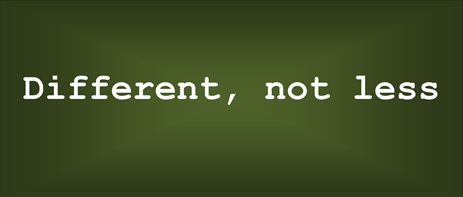I am different, not less. ~Dr. Temple Grandin

I frequently start training on building effective leadership teams with the trailer for the movie Temple Grandin. Temple, born in 1947, has autism. Temple faced a great deal of ridicule because we had little understanding of autism in the 1940s. Her mother’s mantra was, “Temple, you are different, not less,” which is repeated in the trailer. This phrase has also become a tagline for autism awareness. Why do I start building effective leadership teams training with this mantra?
I start with the mantra, people are different, not less because that concept is easy to accept intellectually and surprisingly difficult to put into practice.
I’ve interviewed a lot of leaders and leadership teams over the years. One thing I’ve noticed is that people consistently believe that others would be better leaders if they modeled behaviors that reflected their own preferences. Now, people don’t come right out and tell me, “Joe would be a better leader if he was more like me.” It’s far subtler.
Example
I will listen to someone describe how “Joe” can improve his leadership and then I realize this person is describing their own strengths or natural tendencies. For example, I was recently working with a leader, “Joe,” who is very thoughtful, careful, and can quickly spot potential issues with any idea or suggestion. When I interviewed his colleague, “Sam,” he said “Joe” could improve his leadership by being more visionary, have more of a forward-looking perspective. That certainly could be true. However, “Sam” is also describing his own strengths. As you can imagine, when I then interview “Joe” about “Sam,” “Joe” now says that “Sam” would be a better leader if he wasn’t so impulsive and was more thoughtful and careful.
I’ve tried to think of a scenario I’ve encountered where this was not the case, and so far I can’t think of any examples.
What do leaders need to be more aware of?
- Leaders need to be more aware of their own biases. We are all biased toward our own behavioral style. Yes, you are. I see this all the time.
- In order to lead, effectively, leaders need to adapt or adjust their behavioral style to others.
People are different, not less. If we really practiced this, then why does nearly everyone I interview believe that their leader would be more effective if they demonstrated a behavioral style that is very similar to their own? Because we are biased!
The critical first step to building more effective leadership teams is to recognize and accept the fact that everyone on that team is different, and different doesn’t mean less.